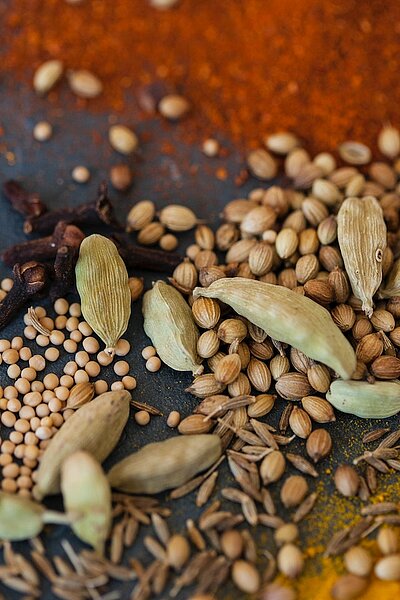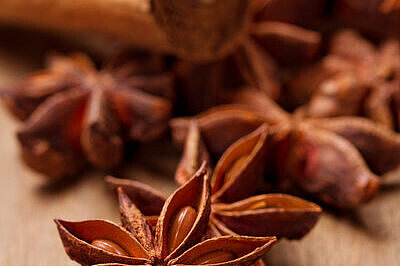Cardamom

What is cardamom?
Cardamom belongs to the ginger family and originally comes from South Asia. The plant has long, narrow leaves and small, yellow-green flowers. Elongated capsules containing the seeds develop from the flowers. These seeds are the actual spice that we know as cardamom. There are various types of cardamom, which differ in shape, color and taste. The best known are green cardamom and black cardamom.
Green cardamom has a light green color and a mild, aromatic taste. It is mainly used in desserts, teas and coffee. Black cardamom has a dark brown color and a smoky, earthy taste. It is mainly used in savory dishes such as curries and stews. Both types of cardamom have similar ingredients and effects.
How does cardamom affect dogs?
Cardamom has a number of positive effects on the health of dogs. For example, it has antibacterial, anti-inflammatory, digestive and antispasmodic effects. It can also help to freshen breath, stimulate appetite and improve mood. In addition, cardamom contains many antioxidants that can protect cells from free radicals.
Some of the benefits of cardamom for dogs are:
- It can help with gastrointestinal discomfort such as bloating, diarrhea or nausea.
- It can help with respiratory conditions such as coughs, bronchitis or asthma.
- It can help with inflammation of the gums or bad breath.
- It can help with stress or anxiety.
- It can help with arthritis or joint pain.
How much cardamom can a dog have?
Cardamom is safe for dogs in small quantities and can even be beneficial to their health. However, care should be taken not to give your dog too much, as this can lead to side effects. Too much cardamom can lead to stomach irritation, vomiting or diarrhea, for example. It can also lower blood pressure or increase the heart rate, which can be dangerous for dogs with heart problems.
The exact dosage of cardamom for dogs depends on various factors, such as the dog's weight, age and state of health. However, as a rule of thumb, a dog should not be given more than a pinch (about 0.5 grams) of ground cardamom per day.
How can you give your dog cardamom?
There are various ways you can give your dog cardamom. One simple method is to mix a little ground cardamom into his food or give him a treat containing cardamom. However, you should make sure that the dog likes the cardamom and does not spit it out or reject it.
Cardamom is a spice from the ginger family and can have positive effects on dogs' health. It has antibacterial, anti-inflammatory and digestive properties and can help with respiratory problems, gum inflammation, stress and joint pain. The dosage depends on various factors, but as a rule a dog should not be given more than 0.5 grams of ground cardamom per day. It can be mixed into the dog's food or offered as a treat. Care should be taken to ensure that the dog tolerates it and does not get too much.
Properties 4
Are you looking for other ingredients with a specific property?
Just click on them to find more.
If you notice any signs of hypersensitivity or poisoning in your dog, you should see your vet immediately. We are not a substitute for a vet, but we try to be as accurate as possible. Every dog reacts differently and we recommend you get a second opinion or consult your vet if in doubt.
Stay healthy and take good care of your four-legged friend!😊
Similar to Cardamom
Cloves are the dried flower buds of the Syzygium aromaticum tree, which is native to parts of Asia and South America. Known for their intense fragrance and flavor, they are valued in the culinary...
Cinnamon is the dried bark of various tree species from the laurel family. There are various types of cinnamon, which differ in taste, color and coumarin content. Coumarin is a natural flavoring...
Nutmeg is the seed of the nutmeg tree, which grows in tropical regions such as Indonesia and India. The seeds are dried and ground or grated into a spice. Nutmeg contains various ingredients that...
Star anise (Illicium verum) is an evergreen plant that grows in the tropical regions of Asia. The fruits of the plant are star-shaped and each contains one seed. The fruits are dried and used whole...



